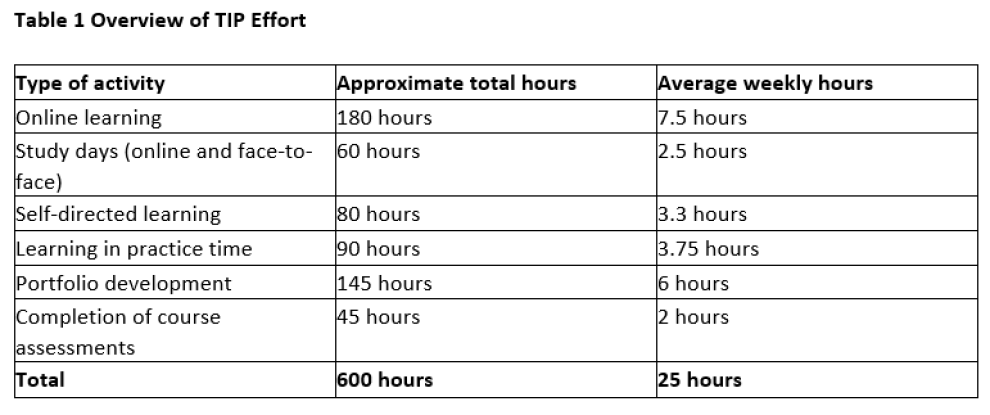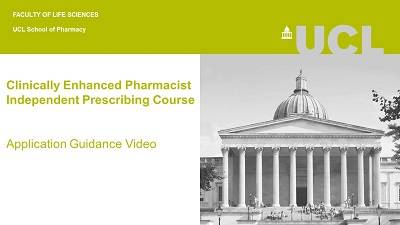The UCL Pharmacist Independent Prescribing Course is funded by Health Education England for pharmacists working in the managed sector. We welcome applications from pharmacists from all sectors.
Successful completion of this course leads to the professional award of Practice Certificate in Independent Prescribing, enabling pharmacists to apply for annotation of their name on the register as an Independent Prescriber. This course is fully accredited by the GPhC.
This Clinically Enhanced Pharmacist Independent Prescribing (CEPIP) course can be studied as a stand-alone course leading to the academic award of PG Certificate in General Pharmacy Practice (Prescribing). It can also be studied as an optional module for the Foundation Stage 2 of the UCL PG Diploma in General Pharmacy Practice leading to the academic award of PG Diploma in General Pharmacy Practice (Prescribing). Further information about studying the CEPIP course as Foundation Stage 2 of the Diploma can be found in the guidance document below.
You can find out more about Health Education England and NHS Managed Sector Approved Suppliers here: NHS Managed Sector.
About the CEPIP course
UCL School of Pharmacy has a long-established tradition of supporting and facilitating the training and development of practicing pharmacists. Independent prescribing is becoming an integrated feature of health service delivery in both primary and secondary care, allowing pharmacists and other health care professionals able to qualify as non-medical prescribers to benefit both patient care and service delivery.
We have developed this prescribing course through consultation with key stakeholders, including service providers, clinical practitioners and pharmacist independent prescribers, to meet the needs of pharmacists wishing to train as non-medical prescribers in primary or secondary care. The course is specifically designed to meet the needs of pharmacist prescribers working in medicines optimisation, GP practice, Urgent and Emergency Care and provision of NHS 111 services and care homes.
The UCL CEPIP course has been developed from the outset as an integrated clinically enhanced pharmacist independent prescribing course. ‘Clinically enhanced’ refers to the additional skills that you will acquire around history taking and physical examination as part of the UCL independent prescribing course. This element has been included to enable you to clinically assess patients using focused medical history taking and physical examination skills whilst having an awareness of additional tests and referral pathways to aid in diagnosis. The course will also enable you to safety-net patients and manage risk.
The overall aim of the CEPIP course is to enable pharmacists to develop the knowledge, skills and attributes to undertake safe, appropriate and cost-effective independent prescribing in partnership with patients, carers and members of the multi-professional team.
Pharmacists will develop a critical understanding of: systematic approaches to clinical assessment, diagnosis, and making prescribing decisions within their scope of practice; the use of evidence-based information to guide prescribing decisions within a clinical governance framework; and, the legal, ethical and professional issues related to prescribing practice. Within the course they will gain practical experience in diagnostics and both mental and physical health assessment.
The course design and assessment strategy are closely aligned to ensure that pharmacists fulfil GPhC requirements to qualify as an Independent Prescriber, attain academic and professional skills to provide excellent clinical care, and continue to develop in their future career.
- Entry requirements
The entry requirements for the course are stipulated by the GPhC. Pharmacists wishing to apply for this course must fulfil the following requirements:
a. Applicants are registered as a pharmacist with the General Pharmaceutical Council (GPhC) or, in Northern Ireland, with the Pharmaceutical Society of Northern Ireland (PSNI).
b. Applicants are in good standing with the GPhC and/or PSNI and any other healthcare regulator with which they are registered.
c. Applicants must have relevant experience in a UK pharmacy setting and be able to recognise, understand and articulate the skills and attributes required by a prescriber to act as the foundation of their prescribing practice whilst training.
d. For the purposes of developing their independent prescribing practice applicants must identify an area of clinical or therapeutic practice on which to base their learning.
e. Applicants must have a designated prescribing practitioner who has agreed to supervise their learning in practice. The applicant’s designated prescribing practitioner must be a registered healthcare professional in Great Britain or Northern Ireland with legal independent prescribing rights, who is suitably experienced and qualified to carry out this supervisory role, and who has demonstrated CPD or revalidation relevant to this role. Although an applicant may be supervised by more than one
- English language requirements
Applicants must be registered pharmacists with the GPhC or PSNI and so must be able to meet the professional standards of the relevant professional body relating to communication.
International students
Applicants must be registered pharmacists with the GPhC or PSNI and have patient orientated experience in the UK. The learning in practice element of the course must be undertaken in the UK under the supervision of a Designated Prescribing Practitioner (DPP) who meets the criteria for acting as a DPP.
- Computer requirements
You must have access to a computer with fast and reliable internet connection. There is a minimum level of computer skills required, including the ability to:
• Navigate the Moodle virtual learning environment to locate teaching and learning materials and to access and submit assessments (with initial basic training)
• Communicate by email
• Work efficiently with Microsoft Word or similar word processing software
• Use the internet to search websites
• Scan and upload documents
• Navigate the e-portfolio system
• Participate in online conferencing (webinars).
- Indemnity insurance
Pharmacists are advised to check with their employer and/or their personal insurer before they begin that they are fully covered in their role as a TIP and a future role as a qualified independent and supplementary prescriber.
- Assessment
The programme draws on a range of assessment methods which address knowledge, competence and performance, using the following approaches:
- Case studies
- Objective Structured Clinical Examination (OSCE)
- Portfolio including practice based assessments
Pharmacists must pass each element of assessment in order to pass the course.
- Study dates
Attendance at ALL the study days is compulsory. Please check carefully and ensure you can attend ALL the study days before you apply. You will be asked to confirm that you can attend all the study days in your application.
Online Webinar Dates:
17 April 2024
8 May 2024
26 June 2024Face-to-Face Dates:
1 May 2024
22 May 2024
5 June 2024
3 July 2024
17 July 2024
16 September 2024
18 September 2024Please note that these dates may be subject to change.
- Teaching and learning
The course constitutes a range of learning activities equivalent to 600 hours study in total (as required for a 60-credit course). Students are supported through a blend of learning activities utilising a bespoke on-line learning package, face-to-face learning sessions and work-based learning (the learning in practice time). There is also a strong emphasis on student led learning and individual study. In all learning activities, the emphasis is on the student putting their learning into practice and reflecting on their development.
Students must have identified an area of clinical or therapeutic practice in which to develop independent prescribing practice. They are required to undertake a minimum of 90 hours learning in practice under the supervision of a designated prescribing practitioner (DPP), learning to prescribe in their chosen area of practice. A DPP is a workplace-based supervisor who supports the student in the learning in practice time. Each student must have one named DPP to support them in their learning in practice time and who takes the primary responsibility for supervision. The learning in practice time must take place in a clinical setting appropriate to the student’s chosen area of practice and must involve interaction with patients.
Please see the
for more information about who can act as a DPP.The course can be completed in 6, 9 or 12 months. This provides flexibility for the differing needs and differing levels of experience. The University based elements of the course take place over the first six months but the supervised learning in practice can be studied up to 9 or 12 months depending on the student’s individual learning needs. The completion date is agreed between the student, the DPP and the Course Team.
For those who complete in 9 or 12 months, at least 30 hours of supervised learning in practice time must take place in the last 6 months of the course.
The breakdown of overall study time is provided in Table 1 (see below). The average weekly hours are based on completing the course in 6 months. For students completing in 9 or 12 months, the weekly total will be reduced as the learning in practice time, self-directed learning and completion of portfolio and course assessments are spread out over a longer period.
Study days take place over the first 5 months of the course. In the weeks where there are study days the amount of time spent in other aspects of the course will be reduced and vice versa. Attendance at the study days is compulsory.

- How to apply
Applications are made by completing both an online application form AND the application pack.
The application pack and other information can be downloaded here:
- The online application form for the PG Cert General Pharmacy Practice (Prescribing) can be accessed above. This will open for application from 11 December 2023.
Both the online application form AND the application pack must be completed in full and submitted by the relevant application deadline. Applications with missing/incomplete information will not be considered.
The application pack requires references and signed forms from both the employing/supporting organisation and the DPP. This will include their CV and where appropriate a copy of their Independent Prescribing certificate. Please ensure that you have provided your DPP with the DPP guidance to help them to complete their section of the application pack.
Applicants should allow plenty of time to complete this pack prior to the application deadline. Applications received after the deadline will not be considered.
Please see the Application Guidance document for more information about the application process.
You can also watch our help video for additional guidance on the application process.
Please ensure you follow the process below to complete your application:
- Complete the online application form when it goes live (see link above).
- When completing the online application form, please ensure you upload the completed application pack under the 'Upload Additional information' section in as few files as possible. There is no need to e-mail the application pack to the admin team.
- Files cannot exceed 2MB in size – larger documents will need to be split into smaller documents before uploading. Applicants are advised to complete the application pack electronically as much as possible and only upload scans of relevant signature pages where necessary to keep file sizes down. There is no limit to the number of files that can be uploaded. Valid file extensions are: JPG, PDF, DOC, DOCX, XLS, XLSX, PNG, GIF, MSG or TXT. Please note that ZIP files cannot be uploaded.
UCL Postgraduate Diploma in General Pharmacy Practice practitioners
Practitioners currently enrolled on the UCL Postgraduate Diploma in General Pharmacy Practice programme who are looking to complete the CEPIP course as the Foundation Stage Two part of their Diploma DO NOT need to complete the online application form. Their application pack and supporting evidence should be emailed to sop.cepip@ucl.ac.uk by the application deadline.
Interviews
Applications are assessed against the entry criteria. Where there are areas of uncertainty applicants will be invited to attend an interview held via video conferencing software. The interview will be carried out by two members of the course team and will focus on seeking clarification of the areas of uncertainty within the application for the applicant to demonstrate that they meet the entry requirements.
You will be informed of the outcome of your application within 6-8 weeks of the application deadline.
 Close
Close


